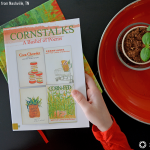
Not only is Intro to the World: Cultures filled with fun stories our kids love to hear, but it also holds encouragement for us as homeschooling parents. That's the beauty of a great book—it is inspiring to multiple ages, touching young children in one way and their parents at a different level.
Read that great book again a few years later, and you will find it touches you once more in a completely fresh way! This bonus is deliberate; one of the criteria for a Sonlight book is that it can be re-read again and again without becoming stale.
Here are three insights I've discovered from Read-Alouds in HBL A. Each lesson is one that applies to adults just as much as it instructs kindergartners.
Lesson 1: Be Resourceful and Creative
My Father’s Dragon, the story of a young boy named Elmer who sets out to rescue a dragon, is filled with examples of using what you have on hand to meet a particular need. In the real world, we don’t need to give a toothbrush and toothpaste to a rhinoceros or magnifying glasses to monkeys, but we’re constantly faced with problems to solve.
Whether it’s organizing books and supplies, keeping toddlers away from disrupting older siblings who are working, or figuring out how to get home, work, and school tasks accomplished each day, we can search for solutions in the objects and skill sets we already have at our disposal.
Better yet, we should ask our kids to help us be resourceful, or, depending on the situation, put them in charge of figuring it out on their own. Not only do you save money by not rushing out to buy a product to fix the problem or a self-help book on the topic at hand, but you give everyone a chance to experience the feeling of success that can only come from working through a problem to its resolution. The more we think outside the box, the bigger our box becomes and the less intimidated we are by the next challenge we face.
Lesson 2: Admit Unrealistic Expectations
Bill loves animals and knows a lot about them, so his decision to get a capybara of his own in Cappyboppy isn’t an entirely bad idea. However, it didn’t take long for problems to arise. Addressing issues one right after another, there came a point when it was clear that owning a capybara simply wasn’t going to work out.
Having done our research, we set out to educate our kids with both excitement and good intentions. However, sometimes things don’t work out quite the way we anticipate. We make adjustments and keep moving forward. But what happens when we keep changing things and the problem remains? Those are the times we need to take a hard look at whether our expectations were realistic in the first place.
- The awesome math curriculum so many people love may be a bad fit for your son.
- Your desire for the whole family to gather in the living room each morning may not be feasible in your current season of life.
- Your daughter may be more productive if she wakes up early and starts her work right away, even though homeschooling allows for a leisurely start to the day.
There’s no shame in admitting defeat. In fact, the one who admits they were wrong and moves on to a better plan is the one who is truly successful.
Lesson 3: Think Past Yourself
It’s human nature to be offended when other people’s choices have a negative impact on our own lives, which is exactly what happens to Ronnie in The Light at Tern Rock. Upset that Byron Flagg has ruined his Christmas, Ronnie spends quite a bit of time wallowing in resentment. Eventually, with time and the example Aunt Marthy sets, he turns his attitude around.
It’s so easy as parents, and definitely as homeschoolers who are with our families all the time, to be like Ronnie, caught up in the frustration and stress that comes when our kids do things that ruin our plans or create unnecessary work for us. We become resentful people who are easily irritated, vacillating between withdrawing from our family and lashing out at them. If we choose instead to be like Aunt Marthy, seeking to understand and show empathy toward others, regardless of whether they’re right or wrong, we’ll create a pleasant home environment and be less miserable ourselves. Not only that, but when our kids’ behavior is a genuine problem that needs to be addressed, we’ll handle it more effectively when we’ve made a sincere attempt to understand why they behaved the way they did.
Whether you curl up on a comfy chair to read to your child, sit at the table and read while they eat lunch, or listen to an audio book together while driving down the road, I challenge you to pay attention to the lessons their books may have in store for you.
If a Read-Aloud has touched you in a profound way, I'd love to hear about it. Leave a comment below.
To find out more about Sonlight's unmatched Read-Alouds, and our complete book-based homeschool programs, order a complimentary copy of your catalog today.








